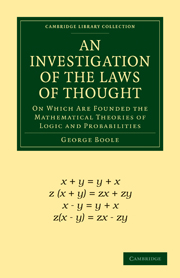 An Investigation of the Laws of Thought
An Investigation of the Laws of Thought Published online by Cambridge University Press: 05 November 2011
OF THE FUNDAMENTAL PRINCIPLES OF SYMBOLICAL REASONING, AND OF THE EXPANSION OR DEVELOPMENT OF EXPRESSIONS INVOLVING LOGICAL SYMBOLS.
1. The previous chapters of this work have been devoted to the investigation of the fundamental laws of the operations of the mind in reasoning; of their development in the laws of the symbols of Logic; and of the principles of expression, by which that species of propositions called primary may be represented in the language of symbols. These inquiries have been in the strictest sense preliminary. They form an indispensable introduction to one of the chief objects of this treatise—the construction of a system or method of Logic upon the basis of an exact summary of the fundamental laws of thought. There are certain considerations touching the nature of this end, and the means of its attainment, to which I deem it necessary here to direct attention.
2. I would remark in the first place that the generality of a method in Logic must very much depend upon the generality of its elementary processes and laws. We have, for instance, in the previous sections of this work investigated, among other things, the laws of that logical process of addition which is symbolized by the sign +. Now those laws have been determined from the study of instances, in all of which it has been a necessary condition, that the classes or things added together in thought should be mutually exclusive.
To save this book to your Kindle, first ensure no-reply@cambridge.org is added to your Approved Personal Document E-mail List under your Personal Document Settings on the Manage Your Content and Devices page of your Amazon account. Then enter the ‘name’ part of your Kindle email address below. Find out more about saving to your Kindle.
Note you can select to save to either the @free.kindle.com or @kindle.com variations. ‘@free.kindle.com’ emails are free but can only be saved to your device when it is connected to wi-fi. ‘@kindle.com’ emails can be delivered even when you are not connected to wi-fi, but note that service fees apply.
Find out more about the Kindle Personal Document Service.
To save content items to your account, please confirm that you agree to abide by our usage policies. If this is the first time you use this feature, you will be asked to authorise Cambridge Core to connect with your account. Find out more about saving content to Dropbox.
To save content items to your account, please confirm that you agree to abide by our usage policies. If this is the first time you use this feature, you will be asked to authorise Cambridge Core to connect with your account. Find out more about saving content to Google Drive.